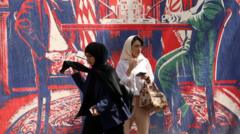The International Atomic Energy Agency warns that Iran's enriched uranium stockpile poses serious questions about its nuclear intentions and compliance with international norms.
Escalating Uranium Enrichment: Iran's Nuclear Ambitions Under Scrutiny

Escalating Uranium Enrichment: Iran's Nuclear Ambitions Under Scrutiny
Iran's uranium production raises alarms as IAEA reports significant growth in stockpile.
Iran has significantly intensified its production of highly enriched uranium, with the International Atomic Energy Agency (IAEA) raising "serious concern" over the development. A confidential report obtained by the BBC reveals that Iran has accumulated over 400kg of uranium enriched to 60% purity, a mark close to weapons-grade material and nearly a 50% increase within just three months. This quantity is sufficient to potentially create around ten nuclear weapons if further processed, making Iran the only non-nuclear-armed nation actively enriching uranium at such a level.
While Iran maintains that its nuclear program is peaceful, the IAEA has indicated it cannot verify this claim. The newest findings show that Iran has been producing highly enriched uranium at a pace of about one nuclear weapon's worth per month during ongoing negotiations with the US, raising alarm among international leaders. IAEA Director General Rafael Grossi highlighted that this escalation poses serious concerns.
Consequently, the US, UK, France, and Germany may advocate for the IAEA's board of governors to determine that Iran is in violation of its non-proliferation obligations. In response to the report, Israeli officials accused Iran of being "totally determined" to obtain nuclear weapons, asserting that such enrichment levels serve no civilian purpose.
Iran's Foreign Minister Abbas Araghchi has countered by labeling nuclear weapons as "unacceptable," stressing that Tehran finds it inconceivable to develop such weapons. Amidst high-stakes negotiations initiated in April, a resolution remains elusive as both parties grapple with critical issues, particularly regarding Iran's ability to continue enriching uranium.
As the IAEA's report delves deeper into Iran’s secret nuclear activities from the early 2000s, uncovering undeclared work conducted at previously unknown sites, the need for comprehensive inspections becomes clearer. Recently, two of Supreme Leader Ayatollah Ali Khamenei’s advisors suggested a possible reevaluation of Iran's stance against nuclear weapons due to mounting external pressure, further intensifying fears of Iran approaching the nuclear threshold.
With an IAEA board meeting scheduled to discuss subsequent actions, there is pressure on Iran to comply fully with international inspection demands and reinstate adherence to nuclear non-proliferation agreements. Observers anticipate that the findings will likely lead to Iran being referred to the UN Security Council, though this action may be postponed until a follow-up IAEA board assembly.
While Iran maintains that its nuclear program is peaceful, the IAEA has indicated it cannot verify this claim. The newest findings show that Iran has been producing highly enriched uranium at a pace of about one nuclear weapon's worth per month during ongoing negotiations with the US, raising alarm among international leaders. IAEA Director General Rafael Grossi highlighted that this escalation poses serious concerns.
Consequently, the US, UK, France, and Germany may advocate for the IAEA's board of governors to determine that Iran is in violation of its non-proliferation obligations. In response to the report, Israeli officials accused Iran of being "totally determined" to obtain nuclear weapons, asserting that such enrichment levels serve no civilian purpose.
Iran's Foreign Minister Abbas Araghchi has countered by labeling nuclear weapons as "unacceptable," stressing that Tehran finds it inconceivable to develop such weapons. Amidst high-stakes negotiations initiated in April, a resolution remains elusive as both parties grapple with critical issues, particularly regarding Iran's ability to continue enriching uranium.
As the IAEA's report delves deeper into Iran’s secret nuclear activities from the early 2000s, uncovering undeclared work conducted at previously unknown sites, the need for comprehensive inspections becomes clearer. Recently, two of Supreme Leader Ayatollah Ali Khamenei’s advisors suggested a possible reevaluation of Iran's stance against nuclear weapons due to mounting external pressure, further intensifying fears of Iran approaching the nuclear threshold.
With an IAEA board meeting scheduled to discuss subsequent actions, there is pressure on Iran to comply fully with international inspection demands and reinstate adherence to nuclear non-proliferation agreements. Observers anticipate that the findings will likely lead to Iran being referred to the UN Security Council, though this action may be postponed until a follow-up IAEA board assembly.




















